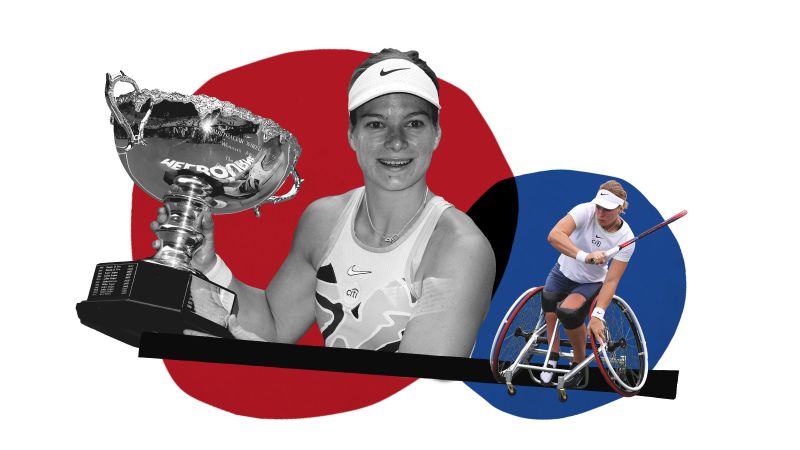CNN
—
It’s one thing to beat the best.
It is, however, an entirely different proposition to be the best. To evolve from the hunter and become the hunted – and not just over the course of a week, month, or perhaps even years.
Moreover, to do so over a prolonged period, set against the backdrop of ever-changing competitors, landscapes and the sands of time and physiology.
Wheelchair tennis player Diede de Groot, though, has been unequivocally the dominant constant in the face of those challenges.
‘Diede the Great’
“I feel a very big target on my back which is what keeps me motivated,” De Groot told CNN ahead of the French Open.
“I know all of these girls are working towards beating me which is fun but intense at the same time.
“They’re not playing with any pressure when they’re playing against me and I have all the pressure because there’s this massive streak that’s following me everywhere.
“At the same time, I really try to forget about all of that and just play tennis.”
In a world where we’re inundated daily with statistics ranging from the intriguing to the inane, De Groot’s numbers make for truly remarkable reading.
She is the first tennis player – wheelchair or able-bodied – ever to win three successive calendar grand slams.
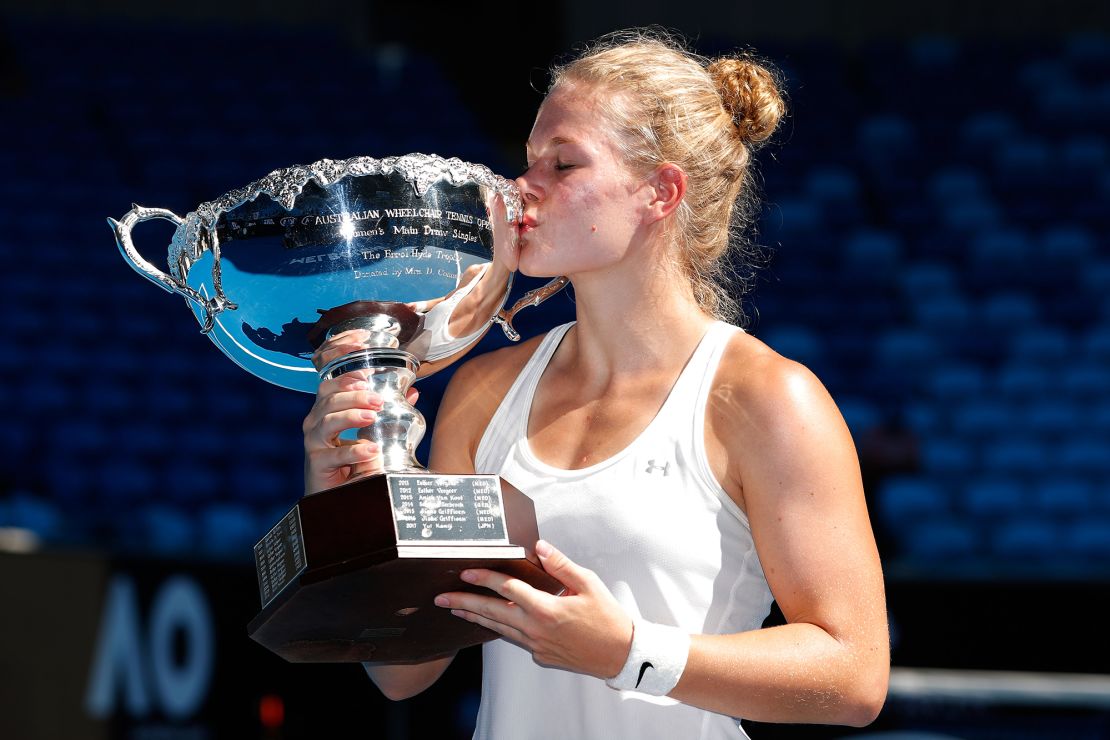
She is the first women’s wheelchair tennis player to achieve the Golden Slam – all four grand slams and a Paralympic gold medal – in 2021.
De Groot is also unbeaten in grand slam tournaments since the 2021 Australian Open, currently boasting a winning streak that has surpassed 130 matches.
Based on facts and figures alone, one would be hard pushed to begrudge the 27-year-old for possessing the bold – yet prophetic and linguistically apt – social media handle of @DiedetheGreat.
“I was too humble to say Diede the Great,” she says smiling.
“My own last name Groot was already taken, so I had to come up with something else and then the literal translation of Groot is great. So that’s how it sort of came to be.
“During the year, maybe I don’t think about it [records] enough … especially in tennis because it’s just like a continuous streak of tournaments. It’s difficult to really take time.
“But when I’m just at home sitting, thinking of the amazing things that I’ve already done to this point, I’m very proud of myself.”
Wall of Champions
So what’s the secret of the Dutch star’s success?
“I don’t think I have the biggest serve. I don’t think I have the biggest forehand,” De Groot reflected. “I just think that I’m very good at all of the levels … I’m a complete player.
“I don’t really have a weak point and that’s very difficult for opponents to, to play against.”
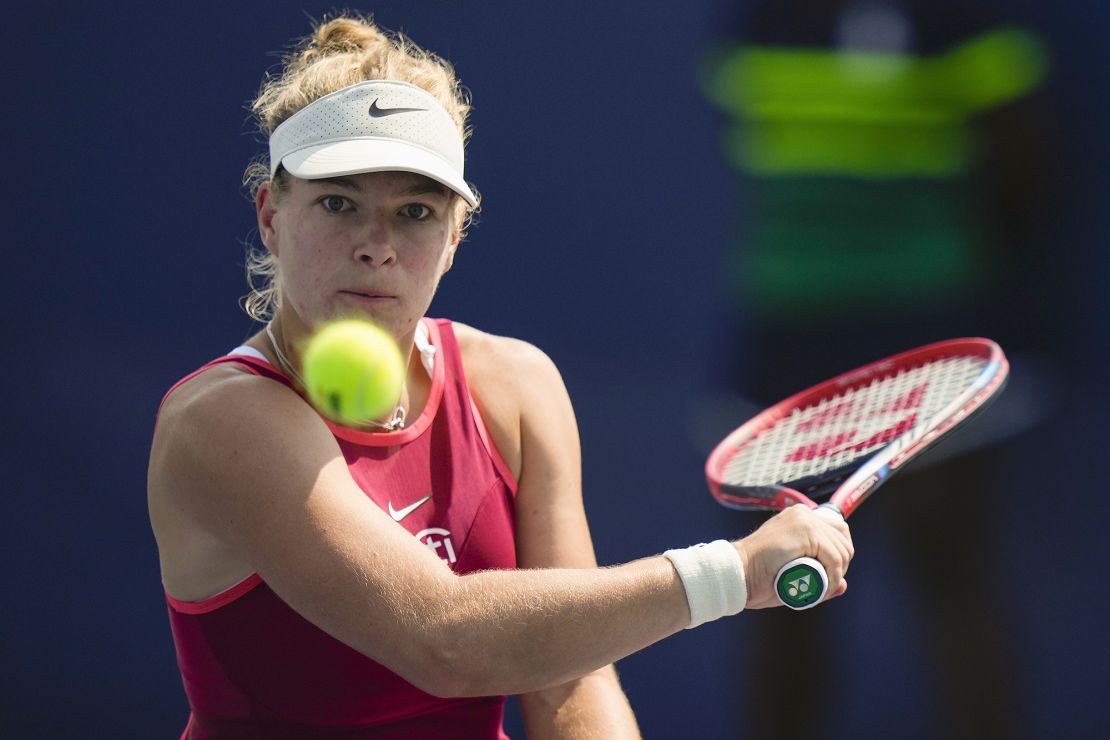
De Groot’s current grand slam singles tally stands at 21.
Her latest victory at this year’s Australian Open was not only a remarkable 13th in a row but it also drew her level alongside the great Esther Vergeer’s grand slam tally.
Vergeer’s 21st and final major title came at Roland Garros in 2012.
Whilst De Groot still has some way to go to encroach on her compatriots astonishing 470-match unbeaten winning streak, it’s fitting then that she’ll have the chance to become the most successful women’s wheelchair tennis player of all time at this year’s French Open.
Victory in Paris would consolidate De Groot’s position as third in the all-time list of overall grand slam champions across singles and doubles.
The 27-year-old’s current tally stands at 39.
Vergeer finished her career with 42 titles, second only to Japan’s recently retired Shingo Kunieda, the most decorated men’s player in the history of wheelchair tennis, who amassed an astonishing 50 majors.
Hotbed of talent
Aside from her technical prowess, the foundations of De Groot’s trophy-laden career – and for that matter her compatriot Vergeer’s – can also be attributed to the Dutch tennis system.
It’s one which allows wheelchair tennis to integrate with able-bodied players, a strategy that has worked to stunning effect.
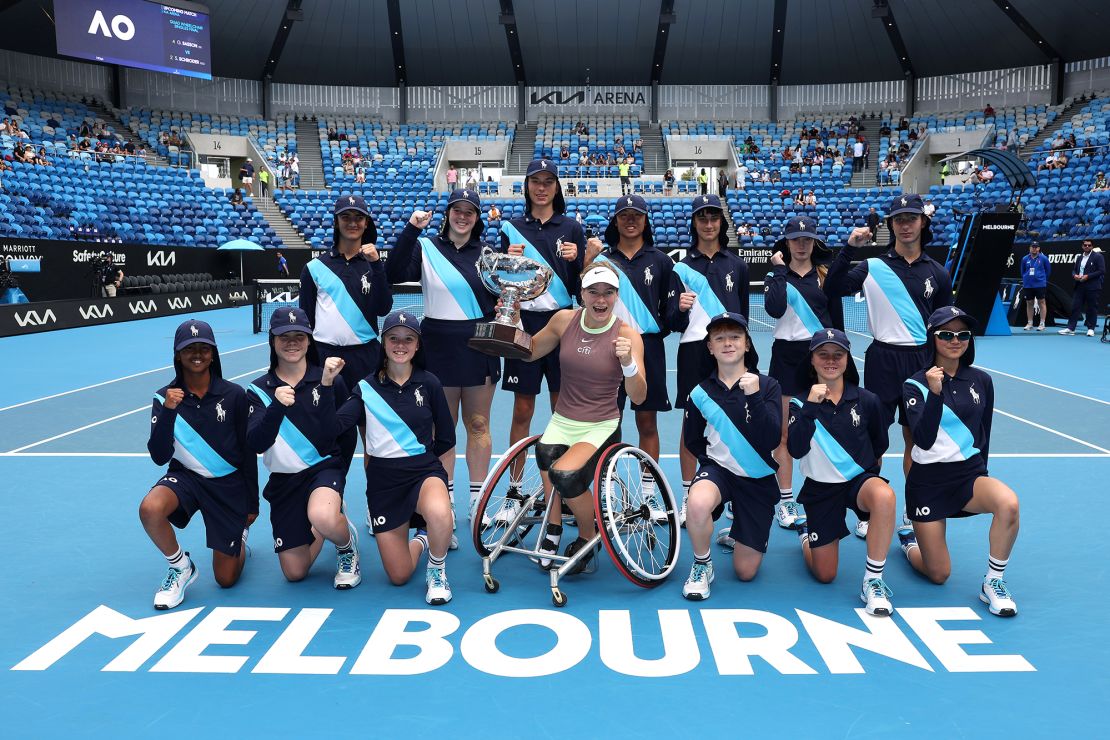
“I started wheelchair tennis when I was seven years old … I had a few operations done on my hip [and] the rehabilitation center advised me: ‘Hey, would you like tennis?’ I picked it up, and I loved it straight away,” said De Groot, who was born with unequal leg length.
“To have that feeling that I could play tennis just like all the other kids in the group … it was very special to have that.
“We are fully integrated into the KNLTB [Royal Dutch Lawn Tennis Association] program. We are treated like athletes [and] being taken seriously really helps taking yourself seriously.”
The KNLT’s National Tennis Centre, located in Amstelveen, boasts 14 outdoor and 14 indoor courts with accessibility for wheelchair tennis.
“Twenty years ago wheelchair tennis was one of the biggest Paralympic sports in the Netherlands,” says De Groot.
“We already were very lucky to have a very good number one gold medalist [Vergeer] and because we were such a small country, we could all see each other play.
“And just learning from previous generations … I could learn from the women that went before me. I could see it from up close and therefore mimic it or even try to do better.”
De Groot and Vergeer both herald from the historic Dutch city of Woerden, which has produced a conveyor belt of some of the greatest players from The Netherlands to have ever graced the sport. So is there something special in the Woerden waters.
“We lived very close to each other which is actually quite special,” De Groot says.
“Another world number one – Jiske Griffioen – also comes from there. So, it’s just a coincidence … but it’s a funny coincidence!”
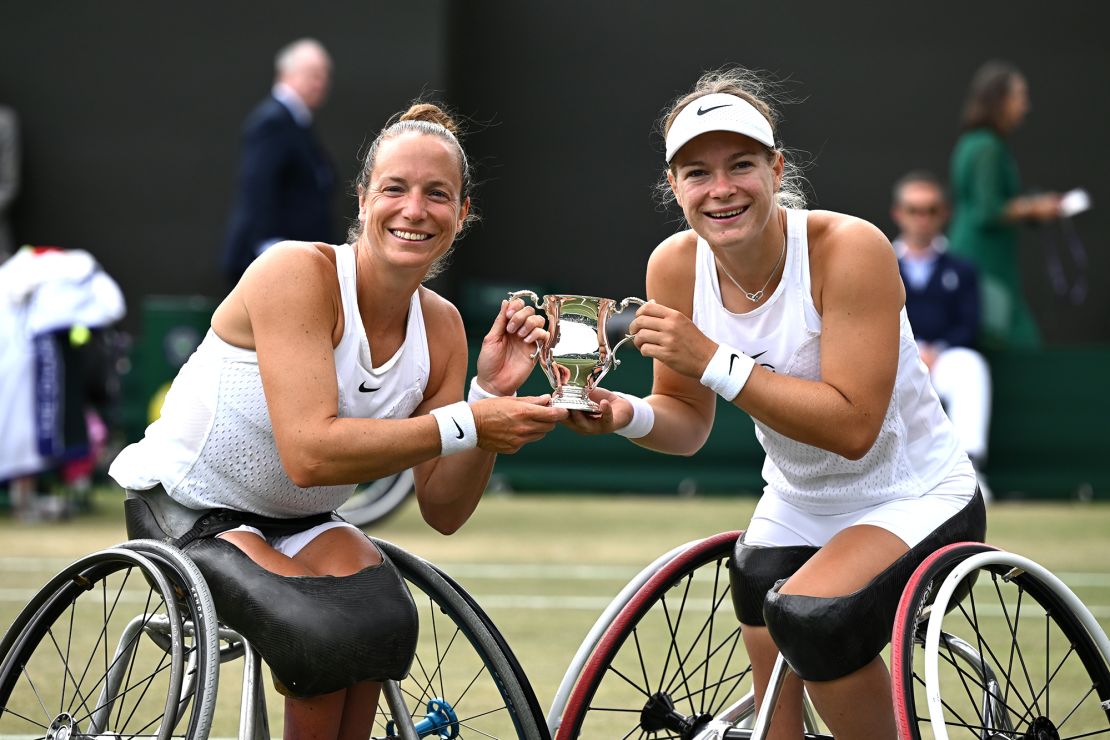
‘We are being noticed’
Wheelchair tennis events are now gradually being incorporated into a growing number of ATP and WTA events.
The prestigious Miami Open hosted an event for the very first time earlier this year and Wimbledon has announced it will double the size of the wheelchair draws for this summer’s tournament.
“I would say that from history, Paralympics were always the moment that all eyes were on us,” reflected De Groot. “We didn’t have to share it with able-bodied athletes.
“But then for another four years, we would sort of fall to the background again … now I really feel like these players are noticing us. They’re recognizing us and interacting with us more and more.
“I saw Jannik Sinner play with our world No. 1 Alfie Hewitt [in Miami]. Novak … he’s done some really good promotion with Dylan Alcott before so hopefully these moments will be more and more
“Countries are developing their programs and players are developing their games. It’s a really fun time to be a wheelchair tennis player.”
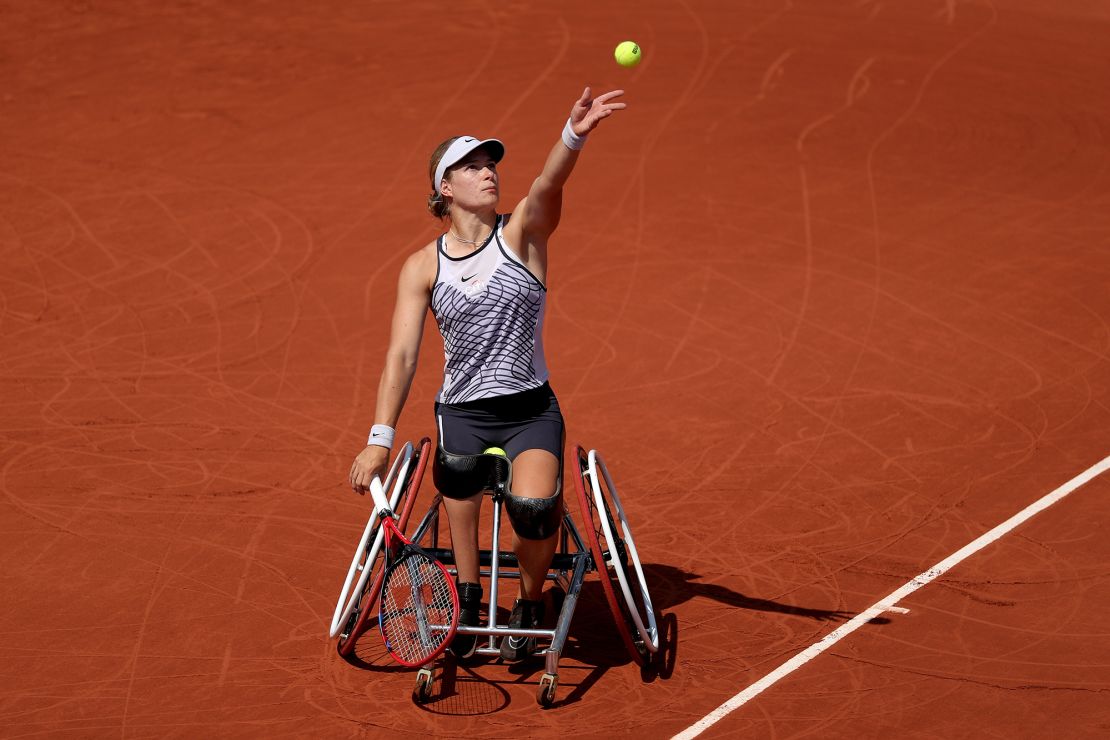
Paris 2024
When it came to the Covid-impacted Tokyo Games, the Dutch star had an unprecedented weight of history of her shoulders.
Dutch women have won every wheelchair tennis title – singles and doubles – since it became a medal event 32 years ago.
De Groot stormed to singles and doubles gold without dropping a set in either competition.
It remains one of the defining moments of her career.
“For a long time, a lot of people ask me that without gold, your career wouldn’t be complete. I never thought about it that way.
“Winning gold in Tokyo really felt like it was like a completion of so many years already that I’ve been doing so well. So many things came from winning those medals that it definitely sparked something around me, which is very good.”
The Dutch phenom is on track to return to the clay courts of Roland Garros to defend her titles this summer at Paris 2024.
It’s a challenge she’s relishing and with her imperious track record to date in the French capital – winning a total of nine grand slam titles – you’d be a brave person to bet against her.
“It’s going to be a different Paralympics,” she says.
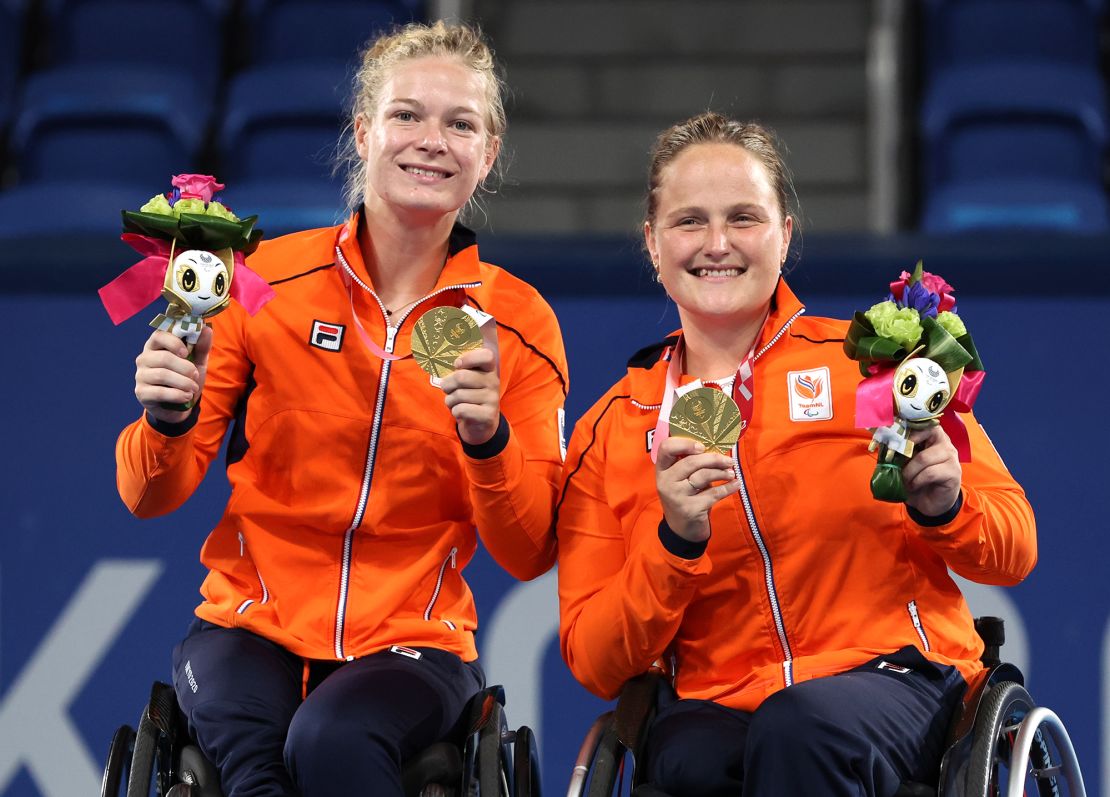
“[I] played in Rio. I was very new there. [I] Played in Tokyo. No one was allowed to come and watch and I had all the pressure there. And now I’m a defending champion with everyone there.
“It will mean everything [to defend the titles]. It’s the goal that I’m aiming at.
“I still have many tournaments before so my head is not yet there, but it will be and I’m going to enjoy it.”


